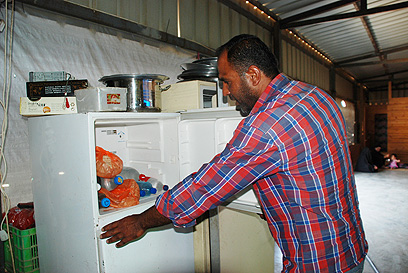_2_a.jpg)
The residents of the village of Al-Araqeeb, which has been razed a number of times since Israel began implementing measures against illegal settlement, say they are aware the bill is intended to drive them off their land; yet even should it pass in the second and third readings, they have no intention of abiding by it.
Related stories:
- Bedouins protest: 'With blood we'll redeem our land'
- Tibi: Bedouin evictions stand no chance
-
Arab MKs tear Bedouin settlement bill
Aziz Abu Madijam, a 38-year-old father of six, told Ynet "two years ago there were almost 600 people in our village, but one day police arrived and demolished the village. From a nice village where everyone without exception is working and paying taxes we were back to being a small tent settlement. They try to represent the Bedouins as people who live in tents and drive luxury cars, but it's only because they don't let us build and develop our lands."
The bill for the regularization of Bedouin settlements in the Negev was submitted by the government based on conclusions drawn by a committee headed by retired Justice Eliezer Goldberg, following an examination by former minister Benny Begin. The Bedouins claim the arrangement in unfair and inadequate.
"My grandfather's grandfather bought these lands in 1904, when the land was under Ottoman rule," Abu Madijam continued. "My grandfather lived on the same exact plot of land during the British Mandate, and me and my father have lived here under Israeli rule. And now we're suddenly invaders upon the State's property."

'This is my land.' Al-Araqeeb (Photo: Barel Ephraim)
"Had I proposed to sell the land to the Israel Land Administration they would recognize me as a proper citizen and say 'such is your territory and you'll get for it so and so.' But when I wish to live on my property the Land Administration suddenly does not recognize our claim on the territory."
"The law is racist, and it aims to make us relinquish our lands willingly. Yet they also say that should we not comply they'll resort to force. I don't want to move to places like Rahat, as it's stricken by poverty and has gradually turned into a crime hub. Why should I move my little boy, of just eight months old, to such a place?"
"My house was a few yards away from the cemetery, a cemetery where my forefathers are buried, that was established in 1903," Abu Madijam further added. "After my house was raised I had to buy a tent and put it inside the burial vault since the police don't come in there and raze. This is my land and I shall not let go of it."
Abu Madijam's wife added "this is where I lived my entire life and this is where I'll perish. Even for each acre of my land they'll offer me an acre in Tel Aviv, I'll say no."
The Negev Coexistence Forum for Civil Equality described the decision as destructive, saying it'll result in enforced evictions of thousands of citizens and expropriation of land by the hundreds of thousands of acres.
"This is a black day for Israeli society," Haya Noah, the director of the nonprofit, told Ynet. "A decision by the parliament that distinguishes between groups based on ethnic origin and perpetuates unequal allocation of resources on a racist principle is a badge of shame for a rule system that calls itself a democracy."
- Receive Ynetnews updates
directly to your desktop















